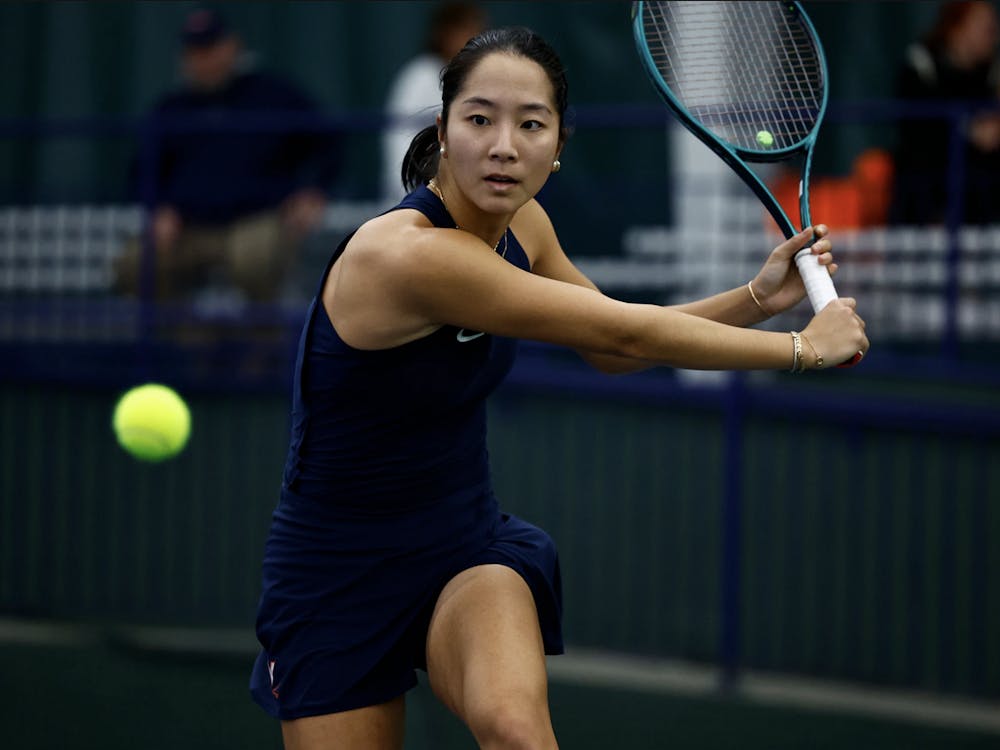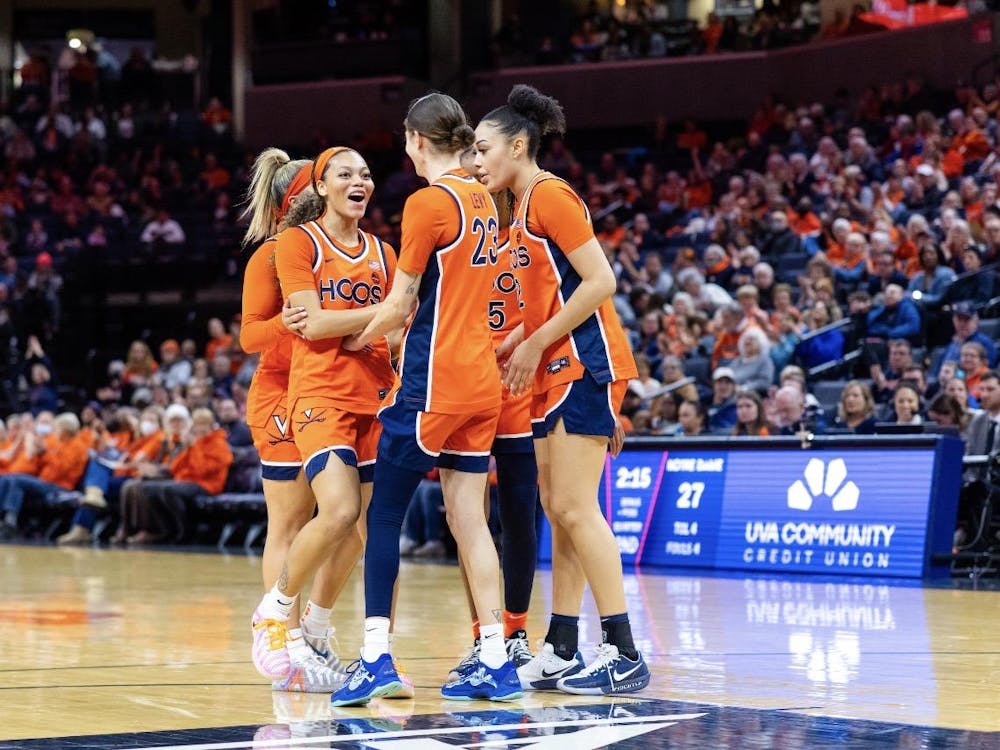My first encounter with Tony Bennett was not a pleasant one, but I won’t hold it against him.
At a news conference held for the newly appointed men’s basketball coach, the floor was opened to questions from attending media. Feeling bold, I waved my hand and was recognized.
So, with athletic director Craig Littlepage sitting on one side and with President John Casteen III on the other, with Al Groh, Howie Long and Debbie Ryan among the hundred or so people in attendance, with still more media calling in via conference call, and with live streaming video on virginiasports.com to the general public, I introduced myself as the reporter from the student paper. Then, I asked the following question.
“In what you’ve seen of Virginia and meeting with the team,” I said, “Do you get a sense of what maybe went wrong the last couple of years and what needs to change?”
The first line of Bennett’s response: “No. That wouldn’t be appropriate to comment on.”
Oh boy.
“Sometimes when you don’t have success, the coaching staff works extra hard,” Bennett continued. “But [they had] a tremendous year three years ago to share for an ACC title. But I couldn’t say that. Hopefully there’s some valuable experience that’s been gained in the last couple of years.”
And so begins my relationship with the new coach. I am now the student reporter who was snide enough to throw a hardball at what was, for all intents and purposes, the new coach’s welcoming party to Charlottesville; Bennett even said the press conference was “like a wedding day.”
To be fair, that was not my intent. I simply was trying to ask the question that every fan wants to know the answer to: What is your plan for turning this program around?
Instead, he took it as, how do you plan on cleaning up the mess left that Dave Leitao left? And, after thanking Leitao and his staff for “all their hard work,” as he put it, that was not a question he was interested in answering. Fair enough.
But enough about my personal experience. There were many other questions — none of them from me, mind you — to which either the new coach or Littlepage had an answer at the ready. Here are some of the more revealing tidbits that I picked up.
1. “The No. 1 pick”
Before Bennett took the floor, both Casteen and Littlepage made opening remarks. Most of it was the expected exchange of niceties; Casteen and Littlepage played up the coach as the right man for the job, talked about how they wanted a guy who understood the true concept of the student-athlete and the teacher-coach, and how Bennett was that guy.
Then, as Littlepage wrapped up by introducing Bennett, he said the following:
“I’d like to introduce my pick — the No. 1 pick — and the future of Virginia basketball, the 2007 National Associated Press Coach of the Year, Mr. Tony Bennett.”
The No. 1 pick. Does that really mean what we think it means? Did Littlepage look at Tubby Smith — who was thought to be a prime candidate nearly from the moment Leitao resigned — and say, nah, let’s go with the 39-year-old from Washington State?
The way he spoke about the process of searching for a new coach, it sure seems likely.
“An extensive list of candidates — coaches — was created,” Littlepage said. “That list ranged from coaches who are household names, coaches who have won championships — both conference championships and national championships — and it also included coaches who were somewhat lesser-known but are outstanding coaches nonetheless.”
Littlepage went on to say that he spoke with current and former coaches, administrators, people familiar with the University, the state, the ACC and with college basketball in general. And through that research and based on the attributes he was looking for, he landed on Bennett.
As if Bennett didn’t have enough pressure in trying to turn around a struggling team in arguably the toughest conference in America, now he has to prove that he can do it better than Tubby.
2. Flexibility
Much has been made on Bennett’s coaching style in the past — namely, his offense. At both Washington State and Wisconsin, where he was either a head coach or an assistant beneath his father, Dick Bennett, his teams played reputably slower, deliberate offensive styles. In three years as the head coach of Washington State, Tony Bennett’s teams scored less than 67 points per game each season, including 59.2 per game last year.
Now, Bennett heads to the high-octane ACC, where no team averaged less than 68 points per game last year and where the top four teams in the conference averaged more than 77.
Clearly, Bennett needs to be flexible, and he quickly dispelled rumors that he is set in his ways or even that his offense is as deliberate as it’s made out to be.
“I think sometimes in the past, our style’s been considered real slow-down — there will be opportunities to run,” Bennett said. “There will be opportunities to get out and go, as long as you’re sound or you’re tough.”
Then, Littlepage — the former men’s basketball coach at both Pennsylvania and Rutgers — jumped in to defend his new coach’s style.
“When you play defense the way that coach Bennett’s teams play defense, you’re forcing your opponent to take longer to take shots,” Littlepage said. “It’s not always that the person that plays the strong defense is playing a more deliberate style of play. Your play on defense forces the other team’s offense to take longer than it normally does to get shots off.”
And it is defense, Bennett said, that has to be addressed first. He wants a team that plays with passion and toughness.
Of course, that’s what we all heard when Leitao — also an up-and-coming coach at the time — was hired four years ago.
But that doesn’t mean it can’t work this time. And as for his offense ... We’ll see, and so will Bennett.
“I don’t have a clear picture of how we’re [going to] play on the offensive end,” Bennett said.
3. Tristan and Jontel
The biggest question for next year is whether Virginia’s 2009 recruiting class, Tristan Spurlock and Jontel Evans, will remain on board with Bennett at the helm. In particular doubt is Spurlock — The Daily Progress reported March 16 that it was a “virtual certainty” that Spurlock would decommit, noting that Leitao and his former head assistant, Bill Courtney, were the primary reasons Spurlock had committed to Virginia in the first place.
Since then, little has come of what Spurlock will do; the only solace that Cavalier fans could take is that Landesberg told reporters that he would do his very best to get Spurlock and Evans to honor their commitments.
Now, what will the new head coach do? One thing he by now has already done — he said yesterday that he would be visiting one of the recruits that night, though he didn’t specify who. The other, he said, he would visit “later.”
“First of all, they have to honor their commitment,” Bennett said. “I’ll just be real with them ... My deal is to try and be competitive and win.”
To be competitive and win, keeping both players — particularly Spurlock — certainly is a top priority.
3. “Three or four years”
Although Wahoos may hope for an immediate turnaround, Bennett wasn’t making any promises. He noted that both he and Littlepage understand that it takes some time to build a program. “It’s going to take three or four years to get your system, to get your players,” Bennett said, “then the expectations are there to really compete at a high level.”
Fans may point out, but what about Washington State? In his first year with the Cougars in 2006-07, Bennett led his team to the round of 32 in the NCAA Tournament; in his second year, they went to the Sweet Sixteen. Each year, the Cougars won a school-record 26 wins.
But what fans must remember is that Bennett inherited the program from his father, running what was at the very least a very similar system. He didn’t have to come across the East Coast, to a conference with an entirely different character, to a team that he had never met. The change at Washington State wasn’t just in-house, but in the family.
“The guy before me was a good coach,” Bennett said with a smile. “It was challenging, but I think what we had was kids that had been through the system and were upperclassmen when I took over.”
On the other hand, last season, during which Washington State went 17-16, is equally impressive. Loaded with a roster of nine freshman, the Cougars went 8-10 in the Pac-10, including a sweep of a home-and-home with Arizona State and a win at UCLA late in the season. Not too shabby.
The final evaluation? Overall, a first impression of a classy, excited coach with the willingness to adapt. Perhaps he should not have specified that it could take “three or four years” to turn the program around — Leitao, after all, left after just four.
From reading various articles that cite numerous experts, however, Bennett seems to have a bright future; he has even been called a “young Coach K.” And as much as people hate on Duke coach Mike Krzyzewski in this neck of the woods, a Coach K in Charlottesville doesn’t sound too bad.






